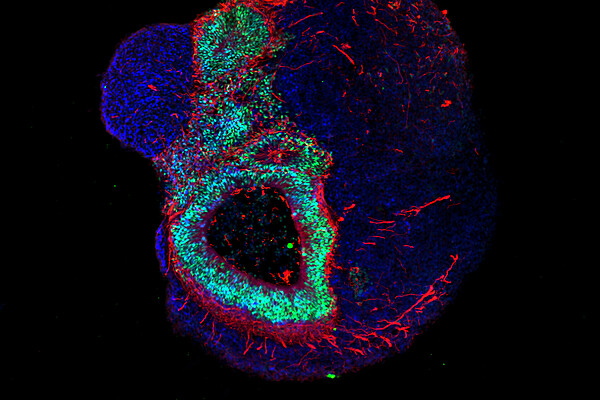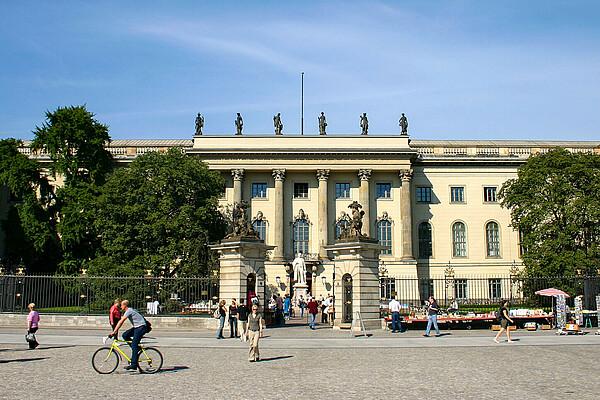Wearables hotspot Berlin
Berlin is a mecca for smart textiles. It’s brimming with revolutionary research projects and its world-renowned facilities are driving the future of wearables. Whether you’re thinking about prototyping, bringing your product to market or scaling up, Berlin is an exciting hub of opportunity for smart wearables.
The German Research Center for Artificial Intelligence (DFKI)
The DFKI is known for its various research facilities and diverse projects. Since 2007, the organisation has had a project office located in Berlin. It provides rooms for joint projects with different public or industrial clients from around the capital region. Their latest research was represented at international computer expo CeBIT – in Hanover in 2017. It was here that they talked about Smart Helmets – an improved safety equipment practice that later came into practice at construction sites.
In one of their central competence centres “Wearable AI”, the organisation solely focused on smart textiles like Smart Soccer Shoes, which measured the speed, contact angle and the strength of the kick, as well as used a smart sport strap that supports and helps build muscle strength during training. The non-profit public-private partnership has research facilities across Germany, including research departments, competence centres and living labs.
Revolutionary research support at Fraunhofer IZM
Berlin is home to the renowned Fraunhofer IZM (Fraunhofer Institute), part of the Fraunhofer-Gesellschaft. Specialising in textile research and innovation since the 90s, it’s a world leader in developing, revolutionising and promoting cutting-edge technology.
For more than a decade, Fraunhofer IZM’s research group System-on-Flex has been developing, analysing and qualifying textile-based electronic technologies. Their ‘TexLab’ laboratory and extensive range of microelectronics offer prime conditions for research and development.
The Institutes’ Start-A-Factory also actively promotes young business ideas and startups working in sensor technology.
Screenstoff: textiles meet technology
In collaboration with the Fraunhofer IZM, researchers at the Kunsthochschule Berlin Weißensee are developing material and textiles that change form. One of their key areas of research is Screenstoff. This ‘screen-fabric’ acts and feels like a textile but can simultaneously function as a screen. And it does much more than just change colour.
Sophisticated, but still at the prototype stage, in the future this washable, wearable textile will allow us to look at digital pictures, check out the weather or sports forecast or even watch our favourite shows from a garment. So your coat, for example, suddenly also functions as a high-quality screen.
Screenstoff also offers a wide range of other possibilities beyond fashion. Business advertising spaces, flashing info boards or as smart upholstery displaying the availability of seats in a restaurant – are some of the many ways it could be used in the future.
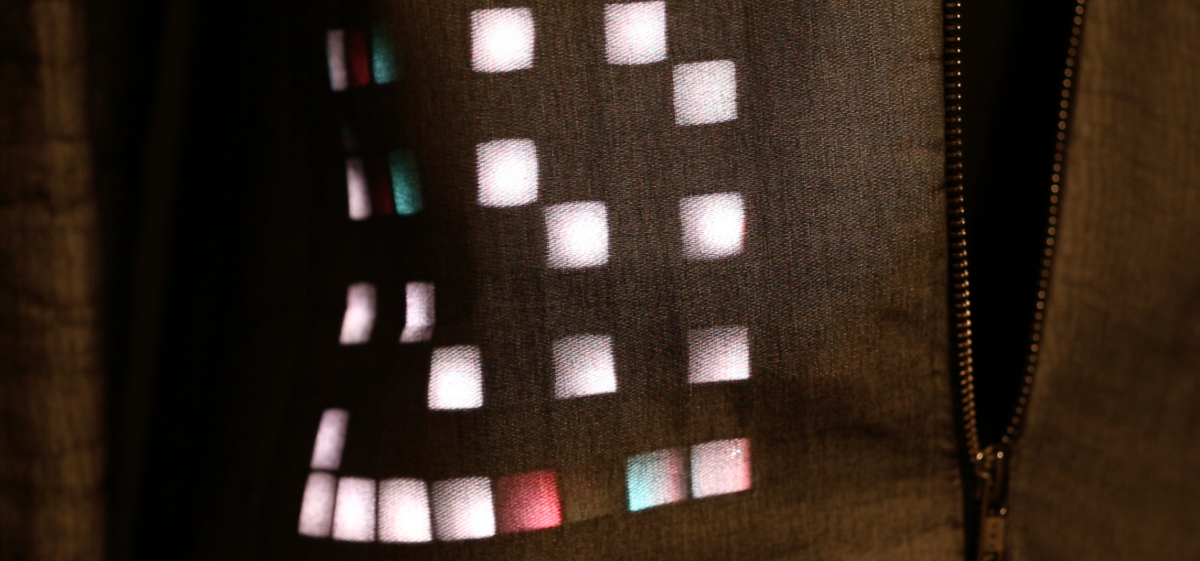
Veronika Aumann, textile designer and former researcher on the Screenstoff project, presented her Screenstoff coat at the Wear It festival in Berlin last June, highlighting future ideas for wearable materials and HCI (Human Computer Interaction).
Berlin's Universities and their smart projects
- Project proto:n at the Berlin University of Applied Sciences (HTW Berlin) – Project proto:n at HTW Berlin explores smart wearables and smart textiles in collaboration with small and medium-sized enterprises (SMEs). Local businesses team up with researchers to develop exciting prototypes for high-tech fabrics and other hardware, like microtechnology-enhanced sportswear.
- Smart-textile-research at the Weißensee Academy of Art – Weißensee Academy of Art (Berlin Weissensee School of Art) is another Berlin institute dedicated to smart textiles research. Their Textile Prototyping Lab brings together textile designers and engineers to foster an interdisciplinary exchange in the early development stages of smart textiles.
- Design Research Lab at University of the Arts – More than 20 scientists are focused on the future of communication design at the Berlin Design Research Lab. They’re exploring the technological possibilities of projects like ‘connected textiles’, which includes developing a specific language to enable interaction between high-tech textiles and the outside world. The University of Arts is also looking after the Wear Sustain Project by the European Commission. The project has for example compiled a glossary to clearly define the terms that are commonly used in and around „wearables“.
Wear It Berlin
Set over two action-packed days, the Wear It Festival is Europe’s hottest wearable electronics and design conference, happening in the heart of Berlin. It attracts people from around the world, including designers, artists, investors, founders, companies, researchers and media.
In addition to showcasing the potential of wearables, the festival also enables people to promote their products, connect with innovators and industry influencers and even meet potential new clients.
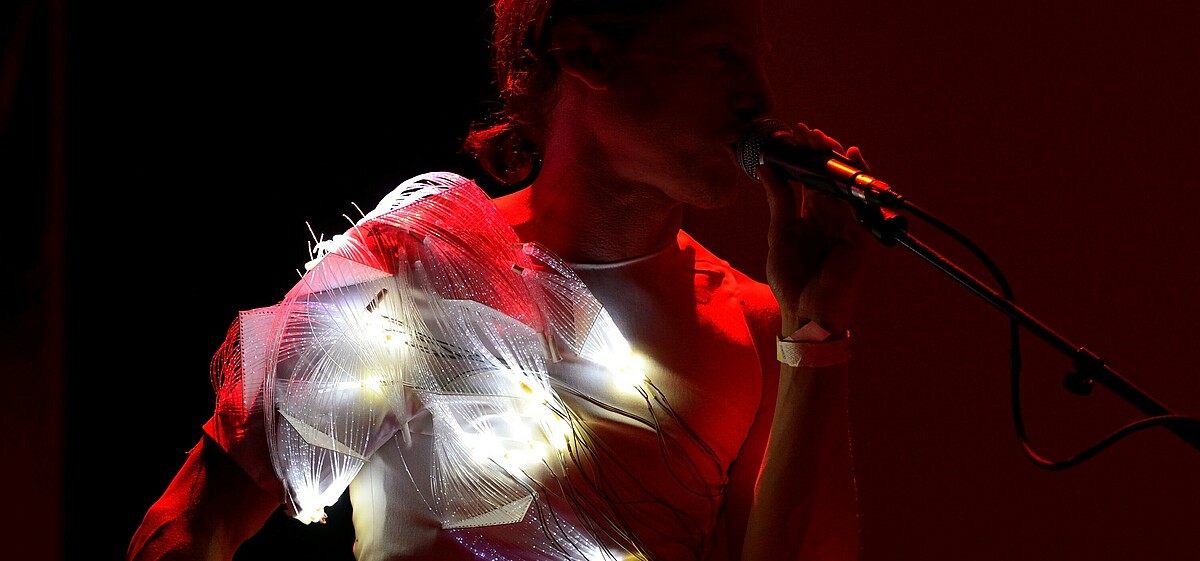
This year, the festival took place fort he fourth time from 19th-20th June. Last year the Wear It Hub innovation network was founded, with the goal to bridge gaps between fashion, lifestyle and technology. The network connects international companies, agencies and creatives to cultivate collaborations and innovative creations.
Besides the festival, the Wear It Berlin cohort also organise a satellite event, the Fashion Hack Day. It’s 48-hours of avant-garde concepting and prototyping.
Wear it Berlin Founder Thomas Gnahm has also established a wearable community meetup group in Berlin. It boasts over 900 members – and growing – who link up at events and venues across the city.
Berlin’s Designer and Wearables
As a fashion metropolis, Berlin stands out due to its diversity and range of artists focusing on different areas. Wearables and Smart Textiles are strongly represented in Berlin, not just by research facilities but by designers who approach fashion with a different perspective – a “smart” one.
Lisa Lang has worked in IT for the last 10 years. Since fashion and design were both passions of hers, she opted to combine these aspects and founded ElectroCouture – an innovation agency for FashionTech. Their latest venture “The Marlene Dietrich Project” focuses on the avant-garde German actress, who dreamed of a wearables technology long before it was even considered in 1958. Now in 2017, ElectroCouture’s collaborations with different designers is making that dream come true.
Since 2010, Moon Berlin has combined fashion and tech in different projects with renowned partners like Faunhofer IZM, Microsoft and IBM. The two ateliers in Berlin are: the FashionTech atelier, committed to transforming ready-to-wear creations into strong statement pieces that are simultaneously innovative and beautiful – and the fine dressmaking and tailoring atelier.
Esther Zahn, who is has been a speaker at Wear It Berlin, is working on smart textiles and the combination of flexible sensors, which are integrated into the clothing. She combines her passion of fashion, music and technologies with her projects.
Interviews with and latest developments about Berlin’s Smart Wearables industry can be found on the Berlin Fashion Week Blog.
#FASHIONTECH - Berlin Fashion Week
Even the biggest fashion event in Germany focuses on Wearables at one of its conferences. FASHIONTECH is one of the higlights at Berlin Fashion Week and invites speakers and the audience to engage with and discuss the latest developments within the field. Keynotes, discussions and presentations about pivotol topics are held on 4th of July at Kraftwerk Berlin. If you want to see up-and-coming stars and discover innovations in Wearables, the Telekom Fusion Award, lets you get a firsthand look at prototypes.
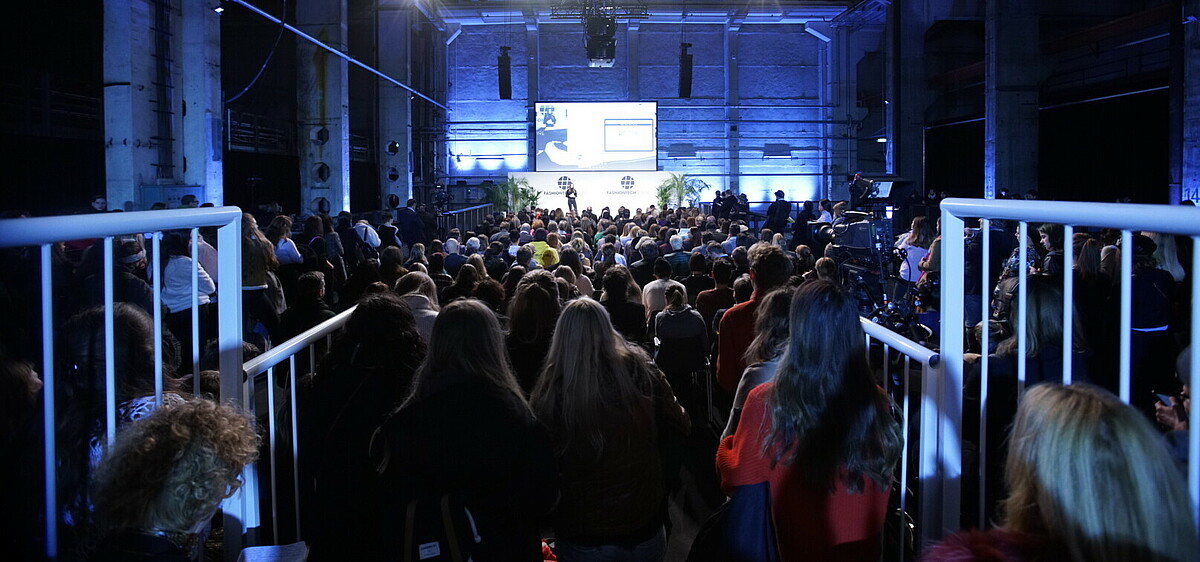
Berlin is brimming with innovation and is constantly developing and evolving: the market doesn’t stand still so researchers constantly strive to improve and invent. This is a thriving creative hub for development and is supported by many innovative institutes.
More Information
About smart clothing and brands in our category "Doing Business"
All about smart wearables and Berlin's Wearables scene: Berlin Fashion Week website
Berlin as a Fashion Location: businesslocation.de/fashion
Header Photo: © Veronika Aumann, Screenstoff 1, Materialprobe, Foto: VMA
Text: Uhura Creative Media – Trish Elms


